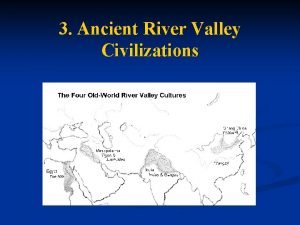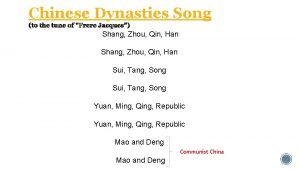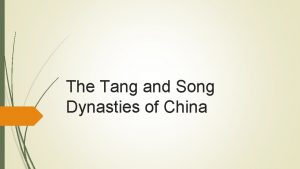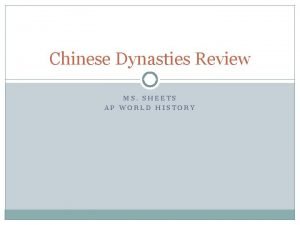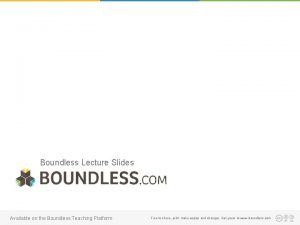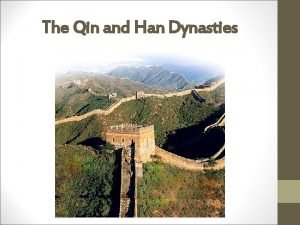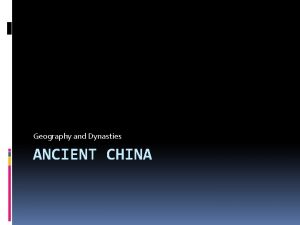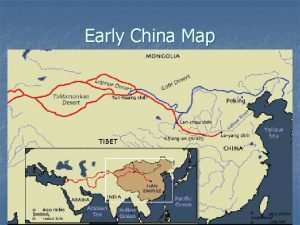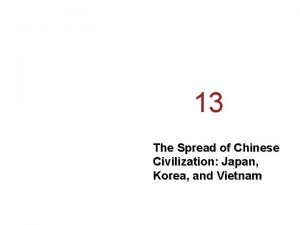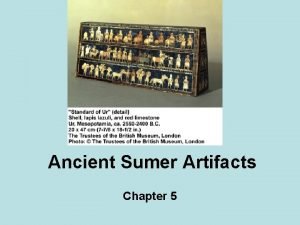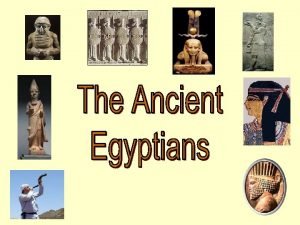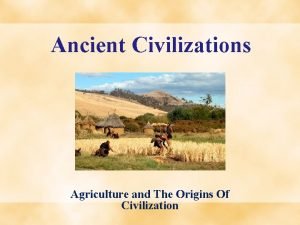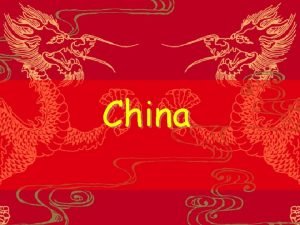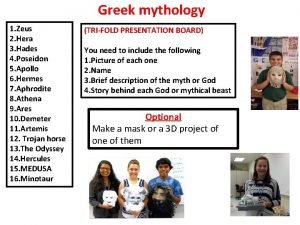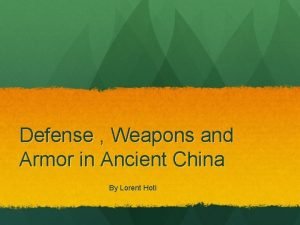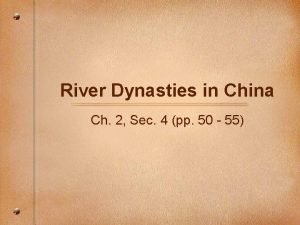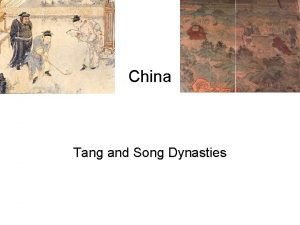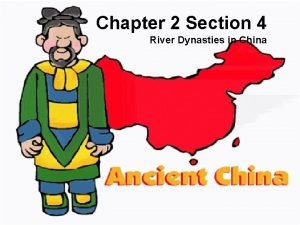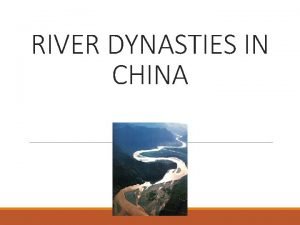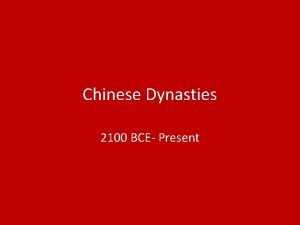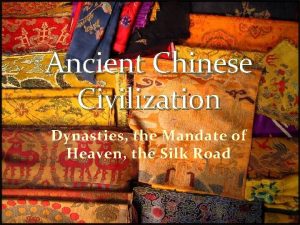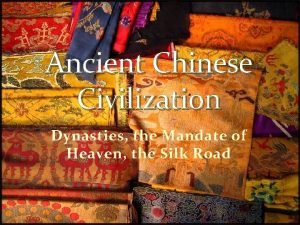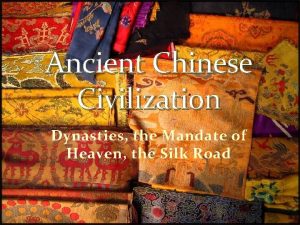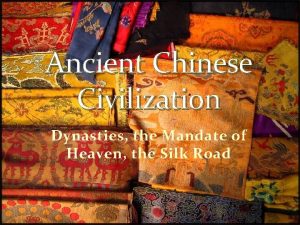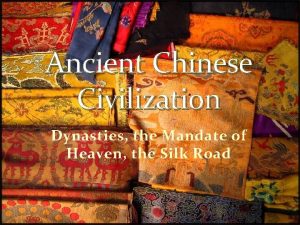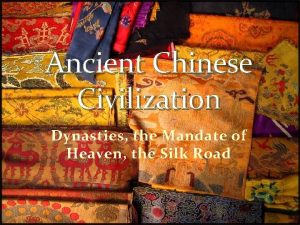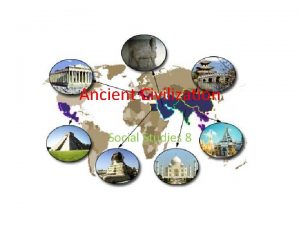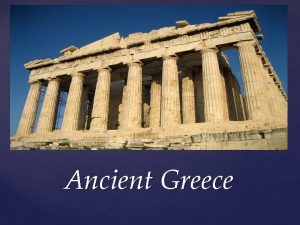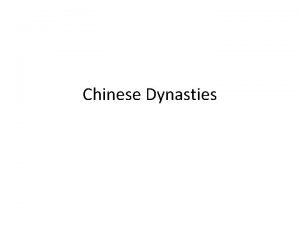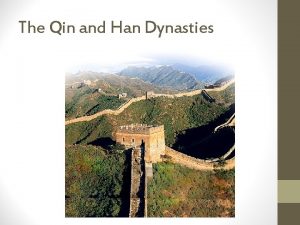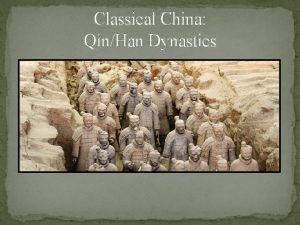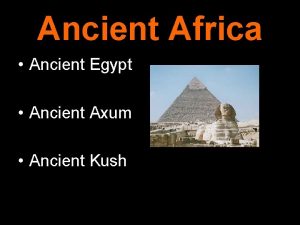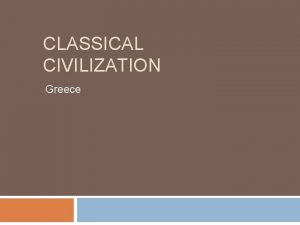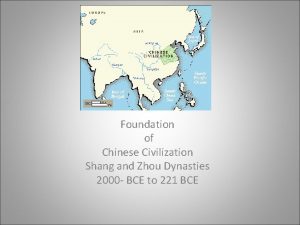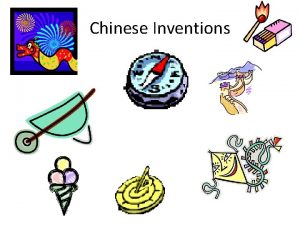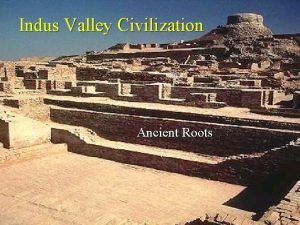Ancient Chinese Civilization Dynasties Dynasties The Chinese have
































- Slides: 32

Ancient Chinese Civilization Dynasties

Dynasties The Chinese have been ruled by a succession of dynasties (families that pass the right to rule the nation from one generation to the next).

The Shang Dynasty Like the Xia Dynasty, the Shang Dynasty was once thought to be only a myth or legend. It is now considered by all historians as a true dynasty. Because many historians do not consider the Xia Dynasty a true dynasty, the Shang Dynasty is often called the first true Chinese dynasty.

Shang Rule: 1500 – 1100 B. C. E. The Shang Dynasty ruled China from around 1500 B. C. E. until 1100 B. C. E. During this 400 year period of history, Chinese tradition states that thirty separate kings ruled from a succession of seven different capitals.

Invention of Writing One of the most important contributions made during the period that the Shang Dynasty ruled China was the invention of writing. The earliest written records found in China come from this time period.

The Zhou Dynasty The Zhou family was able to defeat and overthrow the last Shang Dynasty king in 1028 B. C. E. They claimed that the Shang Dynasty had lost the mandate of heaven due to their poor governing. The Zhou Dynasty would become the longest lasting dynasty in Chinese history, lasting over 800 years.

Zhou Expansion The Zhou set up a new economy, rearranging the affairs of the kingdom. As they did so, the borders of their kingdom swelled, and they were able to maintain control over the people they conquered effectively.

Zhou Regional Rulers Zhou kings assigned nobleman, who were usually members of the royal family, to serve as regional rulers. These nobleman owned the land, and were given absolute authority over it. The peasants could not own land, but instead worked the land for the noblemen.

Noblemen Grew in Power This form of government worked well for several hundred years. However, overtime the king slowly became less powerful, while the nobleman grew in power.

Zhou Dynasty Overthrown In 771 B. C. while fighting against a rebellion, the Zhou armies suffered a terrible defeat. As a result, the Zhou Dynasty lost even more power to the noblemen. They managed to hang on to power for another 500 years. Then in 256 B. C. E. the Zhou Dynasty was finally overthrown.

The Qin Dynasty By 221 B. C. E. a man by the name of Qin had overthrown all remaining members of the Zhou Dynasty, and all other opposition, allowing him to place himself as the ruler of China.

“China”: Derivative of “Qin” The Qin Dynasty would only last about 11 years. Yet during these short years, this dynasty would make changes that would effect the history of China for thousands of years. So influential was Qin, that the name of the nation, China, is a derivative of his name.

Qin Shihuangdi In order to show his importance and power, Qin added a new name to his own. He began calling himself Qin Shihuangdi, which means Qin, the first emperor of China.

Centralization of Authority Qin Shihuangdi again reorganized the affairs of China. Instead of a system of nobleman, Qin wanted everything to be under his direct authority and control.

Written Laws He established a strict set of written laws that were recognized throughout China, and setup military control in each region of China so that local nobleman could not rebel against the emperor. All people are subject to me, Every field harvest, and Everyone can have enough food.

Qin Building Projects To make China the most glorious nation on Earth, Qin needed labor. He used the peasants, forcing them to work under slave conditions, so that he could build roads, bridges, canals, buildings, and his most famous building project of all, the Great Wall of China.

The Great Wall of China Early emperors had built walls in the northern territories to protect their nation against attack from outside forces. These walls were spread across the landscape, and not connected. Qin ordered his people to connect the existing walls together, and to expand them, eventually covering a distance of over 4000 miles. THE GREAT WALL

Peasant Labor Over 300, 000 peasants were forced to help build the Great Wall of China. Many of them died during the construction. After working for several years, the Great Wall of China was completed, and still stands today as one of the great building projects in human history.

The Han Dynasty In the year 207 B. C. a new dynasty began to rule China. This dynasty was led by a peasant whose name was Liu Bang had grown tired of the brutal leadership of the Qin Dynasty. Many other people also were tired of the Qin Peace thru war and plunder.

Mandate of Heaven Liu Bang proclaimed that the Qin had lost the mandate of heaven, or the right to rule the nation. He was able to overthrow them, and establish himself as the new emperor of China, and the first emperor of the Han Dynasty.

Four Hundred Year Rule The Han Dynasty would rule China for the next 400 years. During this time period they would be one of the wealthiest and most powerful nations on Earth. Their achievements would only be surpassed by the Roman Empire.

Isolated from Rest of the World Because of its location amidst high mountains and surrounded on many sides by water, China was isolated from much of the rest of the world. As their civilization flourished and their wealth increased, they were largely unaware of what advancements were taking place in the nations around them.

Chinese Exploration In 139 B. C. E. , a Han emperor by the name of Wudi sent out one of his generals, Zhang Qian, to explore other nations. This general and his army marched throughout distant regions visiting other civilizations and nomadic tribes.

Attacked by Nomadic Tribes The armies of Zhang Qian were viewed as a threat by many of these nomadic tribes, as a result, these tribes attacked and destroyed many of Zhang Qian's men. Zhang Qian himself was captured and kept in bondage for a period of 10 years. After 13 years, Zhang Qian was finally able to return to the emperor and report.

Wudi Aspires to Trade with West He told Wudi about stories he had heard from the nomadic tribes of a great civilization to the West that equaled the glory of China. This was the first time Wudi had heard anything of any other civilizations. Wudi was a smart and wise ruler, who saw the potential for trade between the two cultures.

The Silk Road In order to make trade possible , Emperor Wudi began to develop what has been called in modern times, the silk road. Following this route merchant traders took silk from China to the West, and brought glass, linen, and gold back to China.

Trails, Roads, Bridges The silk road consisted of trails, roads, bridges, and pathways that stretched across nearly 5000 miles of land water. The silk road is not one long road, but rather many smaller roads and pathways that were connected, and worn by the use of thousands of travelers over a period of hundreds of years.

Expansion of Trade The silk road would become instrumental in the development and expansion of trade, and the accumulation of wealth in both China and Rome, as well as in Egypt and other nations.

Pax Sinica During the rule of the Han emperors, China enjoyed a 400 year period of peace and prosperity. During this time, the Han emperors established a strong central government that was designed to help the people, and protect them.

Food Reserves One such innovation was the storage of food. During times of plenty, Han emperors would have great amounts of food put up into storage. Then during difficult times, they would sell these food stores, helping to stabilize food prices.

Merit-Based Appointments The Han also abolished the practice of giving powerful government positions to members of the royal family. Emperor Wudi instituted a series of written exams. Anyone could take the tests. Those who received the highest scores were given posts in the government.

The End of the Han Dynasty By C. E. 220 the Han Dynasty had fallen into a weakened state. Warriors from competing areas began fighting one another, throwing China into a period of civil war that would last for many years.
 What is believed to be the 1 stdynasty of ancient china?
What is believed to be the 1 stdynasty of ancient china? Water clocks han dynasty
Water clocks han dynasty Shang zhou qin han sui tang song
Shang zhou qin han sui tang song Empress wu accomplishments
Empress wu accomplishments Ap world history chinese dynasties
Ap world history chinese dynasties Shang dynasty
Shang dynasty Four chinese dynasties
Four chinese dynasties Zhou dynasty geography
Zhou dynasty geography China dynasty
China dynasty Chinese civilization map
Chinese civilization map Bushi
Bushi Was ancient sumer a civilization chapter 5
Was ancient sumer a civilization chapter 5 Ancient egypt civilization geography
Ancient egypt civilization geography Ancient egypt civilization
Ancient egypt civilization Ancient civilization agriculture
Ancient civilization agriculture Anglo chinese school primary
Anglo chinese school primary 6 faces 8 corners
6 faces 8 corners Ancient chinese religion
Ancient chinese religion Ancient chinese matches
Ancient chinese matches Hera interesting facts
Hera interesting facts Ancient chinese armor and weapons
Ancient chinese armor and weapons Ancient communication devices
Ancient communication devices Ancient india vs ancient china
Ancient india vs ancient china Did the ancient hebrews have specialized workers?
Did the ancient hebrews have specialized workers? Where was the sui dynasty located
Where was the sui dynasty located Slave khilji tughlaq lodi dynasty
Slave khilji tughlaq lodi dynasty Chapter 2 section 4: river dynasties in china answer key
Chapter 2 section 4: river dynasties in china answer key Tang and song venn diagram
Tang and song venn diagram Social classes in song dynasty
Social classes in song dynasty Sui dynasty achievements
Sui dynasty achievements River dynasties in china
River dynasties in china Song
Song Srivijaya empire definition ap world history
Srivijaya empire definition ap world history
